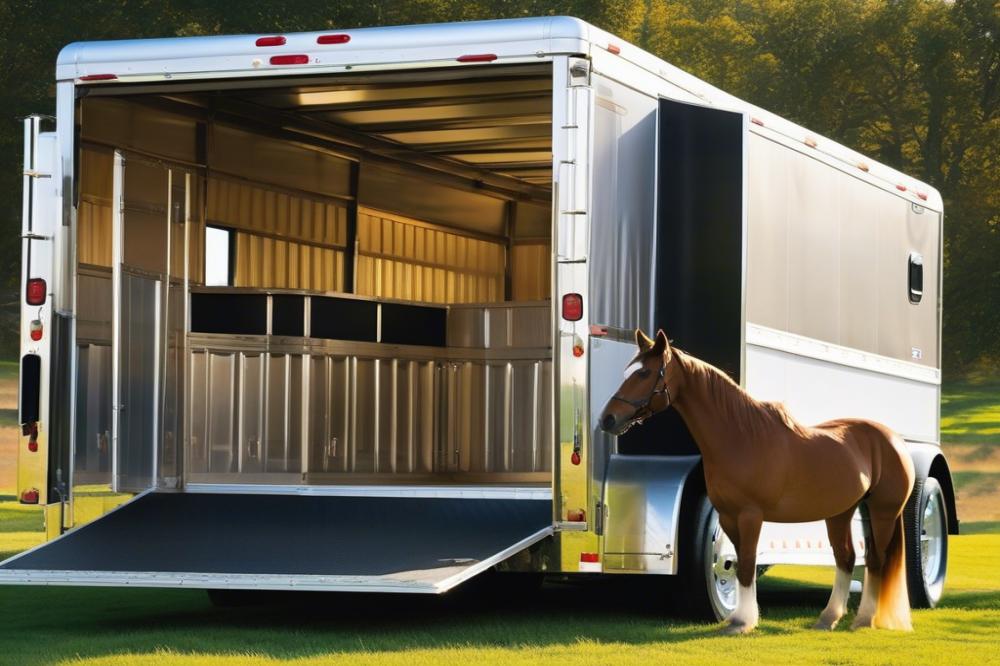Key Factors to Consider When Choosing a Reliable horse transport service
Selecting the right company for moving horses is crucial. Horses require special care during transportation due to their size and temperament. A trusted horse transport service can make this process safer and more comfortable for your animals.
Transportation needs for horses go beyond simply getting from point A to point B. Each equine has unique needs, from space requirements to dietary considerations. Comfort and safety should always be at the forefront of any move.
As you weigh your options, several key factors will guide your decision. These include the company’s reputation, the condition of their vehicles, and the qualifications of their staff. Understanding these elements will help you find a reliable horse transport option that meets all your needs.
Understanding Horse Transport Service

A horse transport service refers to a specialized method of moving horses from one location to another. Transporting these animals safely requires knowledge and experience. Owners often seek assistance to ensure their horses arrive at their destination comfortably and without stress.
Types of horse shipping Options Available
Various options exist for horse shipping. Ground transport is the most common choice. This method uses specialized horse trailers equipped for the journey. Air transport is an option for long distances, particularly for international travel. Chartering a flight can be costly but might be necessary.
Within ground transport, there are two primary types: domestic and commercial. Domestic services typically cater to personal needs, such as moving a horse to a new home or attending an event. Commercial services often cater to shows and competitions, managing multiple horses at once for professional use.
Overview of Different Horse Trailers and Their Features
Choosing the right trailer is crucial. Various trailers exist, each designed for specific needs. A standard slant-load trailer allows horses to travel at an angle. This design may provide them with more comfort during the ride. Straight-load trailers offer a different arrangement, where horses face forward. Some prefer these for the sense of stability they provide.
Additionally, a two-horse trailer accommodates small loads. Larger models can hold up to six horses. Features such as ventilation and padded dividers add to the comfort. Most newer trailers also include rubber flooring to minimize slipping. Safety is paramount, so ensure that the trailer has adequate tie rings and escape doors for emergencies.
Investing time in selecting the right transport option and trailer will lead to a safer journey for both the horse and the owner. Take into account factors such as distance, number of horses, and specific needs when making your decision. Understanding each option helps ensure a smooth transport process.
Transport Safety

Transportation safety is a top priority when moving horses. Every horse owner knows that these animals can be sensitive to changes in their environment. Thus, selecting a reliable service involves understanding the safety measures in place during transport.
Importance of Safety in equine transportation
Every step in the transportation process should prioritize the horse’s well-being. An unsafe journey can lead to injuries, stress, or even worse outcomes for your equine friend. The right transport service recognizes this responsibility and implements strict safety protocols to protect each horse.
Key Safety Features to Look For in a Horse Trailer
Not all horse trailers are created equal. When choosing a trailer, check for sturdy flooring that provides grip and prevents slipping. Additionally, reliable access points such as side ramps and wide doors make loading and unloading much easier.
Braking systems should be effective. A well-designed trailer uses either hydraulic or electric brakes, ensuring better control during transit. Look for features like padded dividers to keep horses from bumping into one another. This helps to reduce anxiety and possible injuries.
Vet Care During Transport and Its Significance
Having veterinary care readily available can make all the difference. Every transport service should have protocols for emergencies. Instant access to a veterinarian can address health concerns swiftly, minimizing stress for both horse and owner.
Ensuring Proper Ventilation and Comfort for Horses During Travel
Good ventilation is critical when transporting horses. Stale air can lead to respiratory issues, especially during long trips. Look for trailers designed with windows and vents that allow fresh air to circulate freely.
Comfortable conditions are equally important. Providing ample space allows the horse to balance and adjust its stance during the ride. Consider padding in the trailer to further enhance comfort and reduce stress. In creating a calm environment, you foster a more pleasant journey for everyone involved.
Experienced Drivers and Qualified Staff
Drivers with experience play a vital role in the safe transportation of horses. Their knowledge helps them navigate various road conditions and handle unexpected situations. Horses can sense emotions, and a calm, confident driver can ease their stress during travel.
Training is crucial for staff who handle and care for horses. Well-trained personnel know how to manage equine behavior, which is essential for a successful journey. Knowledge about horse anatomy, health needs, and first aid also contributes to a safer environment. From loading to unloading, skilled staff can make the experience smoother for both the horse and its owner.
When assessing the qualifications of a transport team, it’s important to ask specific questions. Look for certifications or credentials in equine care or transport. Experience does matter; seasoned staff usually have a well-developed understanding of horse behavior. Observing how they interact with horses can reveal their expertise and comfort level with the animals.
Communication is another key factor. A competent team should be open to discussing their methods and answering any questions you may have. Their willingness to share information about care protocols can provide peace of mind. After all, caring for your horse during transit should always come first.
Ultimately, picking a transport service with experienced drivers and qualified staff is not just about convenience. It’s about safety and ensuring the well-being of your horse. Trust is built through proven expertise and extensive training. Choose wisely to give your horse the best possible experience during transport.
Insurance and Liability
Choosing a reliable horse transport service means considering insurance and liability as key factors. Insurance serves as a safety net, protecting both the horses and their owners during transport. Without adequate coverage, you might find yourself liable for costly damages or injuries that could occur while your horse is in transit.
Importance of Insurance for Transport Services
Insurance is not just a formal requirement; it provides peace of mind. Horses are valuable and sensitive animals. They can be prone to accidents. The unexpected can occur at any time, and having proper coverage is vital. Without it, the financial burden of an incident can be overwhelming.
Types of Coverage Available for Horse Transport
Various types of insurance coverage exist for horse transport. Some common options include liability coverage, that protects you from claims resulting from injuries or damages. There is also cargo coverage, which offers protection for your horse in case of accidents. Accident insurance specifically addresses medical needs for the horse if an incident occurs on the road. These options can vary widely, depending on the provider and specific needs.
Understanding Liability in Case of Accidents or Injuries
Liability is crucial to comprehend. If an injury happens during transport, it can lead to tough questions about responsibility. Knowing who is liable helps prevent disputes. Often, a contract between the owner and the transport service will outline the liability terms. Reviewing this carefully is key. In certain cases, liability may fall on the transport service if they are negligent. In other situations, owners may bear some responsibility, especially if issues were pre-existing.
Furthermore, seeking transparency regarding the transport service’s insurance policy is clever. Sometimes, transport companies promote their strong insurance coverage as a selling point. Getting these details upfront helps ensure that there are no surprises down the line.
Paying attention to these details can safeguard both your investment and your horse’s well-being. When you look for a transport solution, consider these factors seriously. Being informed can make all the difference in ensuring a smooth travel experience for you and your horse.
Transport Regulations
Transporting horses involves adhering to many rules and guidelines. Various regulations govern the safety and well-being of equines during their journey. These laws apply across states and at the federal level, making it crucial for transporters to understand them.
Federal regulations often specify the conditions under which horses can be transported. For example, the Animal Welfare Act lays out important welfare standards. States may have additional laws that transporters must follow as well. This patchwork of rules ensures that horses receive appropriate care while they travel.
Choosing a transport service that follows these regulations can safeguard your horse’s health. Non-compliance with existing laws can result in penalties and dangerous situations for equine passengers. A reliable company will possess all necessary permits and licenses to transport horses legally.
Safety must be a priority in horse transport. Compliance not only protects animals but also the owners who rely on these services. Regulations often require specific training for drivers, proper ventilation in trailers, and monitoring systems during transport.
A responsible transport service will openly share its adherence to these regulations with clients. Transparency is key when discussing compliance. If a company hesitates to provide this information, it could signify possible risks.
Ultimately, knowledge of transport regulations helps advance the welfare of horses. Owners should always ask about the transport service’s regulatory compliance. This practice builds trust and assures that your horse is treated with respect and care during transit.
Customer Reviews and Reputation
Evaluating Customer Reviews
Reading customer reviews is essential when selecting a horse transport service. Look for specific details in the comments. Are clients satisfied with the care given to their horses? Notes about timely arrivals and communication are also key. Frequency of complaints or praises should weigh heavily in your decision. Be wary of overly vague comments. They often lack credibility. Consider the overall trend in reviews rather than individual opinions.
The Importance of Reputation
Reputation plays a crucial role in the equine transportation sector. Companies with a strong reputation often have years of experience. They are more likely to prioritize the safety and comfort of the horses they transport. Unreliable services may compromise the wellbeing of your animals. Check if the company is recognized by equine organizations. Such affiliations can indicate a commitment to quality service.
Tips for Finding Reliable Testimonials
Finding trustworthy testimonials can feel overwhelming. Start by asking friends or local equestrian clubs for recommendations. Personal referrals often lead to dependable services. Online reviews can also help, but verify their sources. Look for testimonials on multiple platforms to ensure consistency. Social media pages may offer real-time feedback from current users. Engaging with past customers can also yield valuable insights.
Final Thoughts on Choosing a Reliable Transport Service
Recapping the critical factors for selecting a horse transport service is essential. Before making a decision, consider safety, experience, and reputation. These elements are vital for ensuring a smooth journey for your horse. A company with a track record in equine transportation may provide the best peace of mind. Each transport option should be assessed carefully, taking into account the specific needs of your horse.
Being informed can make a world of difference in horse shipping decisions. Ask questions and clarify doubts. It’s crucial to understand how the service operates and what safety measures are in place. Look for reviews or testimonials from other horse owners. These insights can offer a clearer picture of what to expect.
Prioritizing safety should always come first. Horses are sensitive animals, and their well-being during travel is non-negotiable. Choose a service with trained professionals who understand horse behavior. Experience is also key. A company with years in the business is likely more equipped to handle unexpected issues.
In conclusion, selecting the right transport company for your horse is not just about convenience; it’s about making a responsible choice. Trustworthy services prioritize horse welfare. By focusing on the right factors, you can feel confident in your decision.



